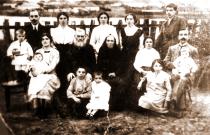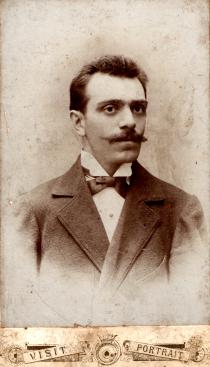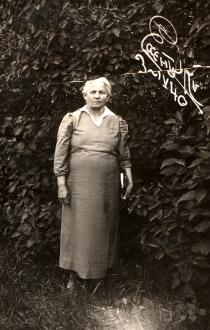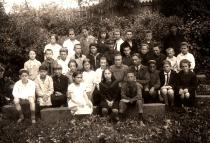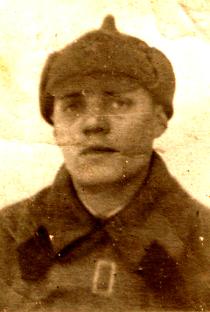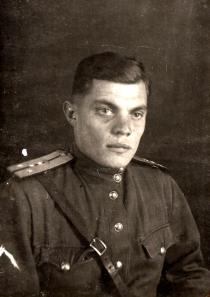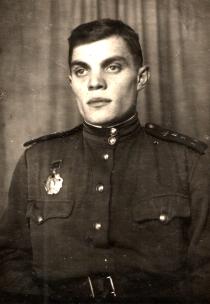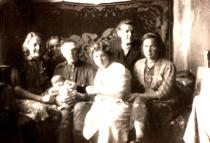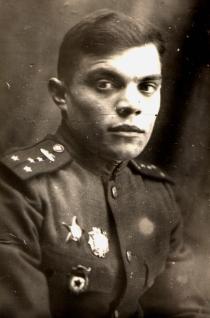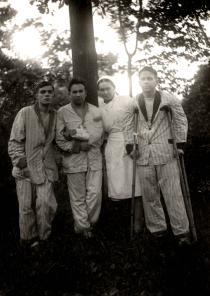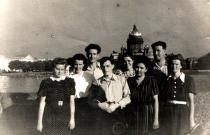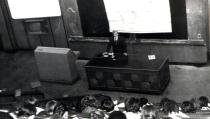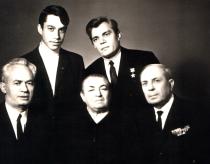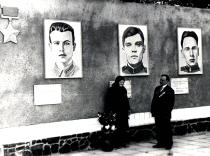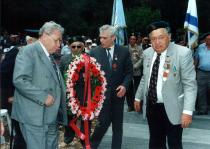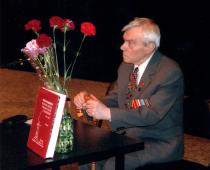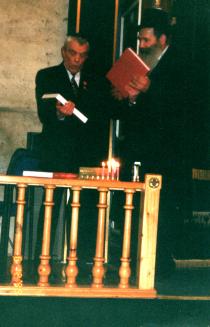This is me, Moisey Marianovskiy, recruited to the Red army few months before the Great Patriotic War. I'm a soldier of the Soviet army. This photo was taken in Porokhov town in 1940; I sent it to mama in Moscow.
In 1932 my older brother Yasha was in the army in Moscow. He became an officer. He wrote that there were better food supplies in Moscow and it was easier to find a job here. In 1933 our family moved to Moscow from Kirovograd. We lived in Izmailovo district in Moscow. At that time this was a suburb of Moscow. We moved into a 19-meter room in a shared apartment. We hardly had any furniture. There was very little space. When my brother went to work I took his place on the bed. We were very poor. Those were hard times. We hardly ever ate to our hearts' content, but at least we did not starve. Gradually our life was improving. I finished secondary school in Moscow. I worked at the plant and studied. This was hard. I worked the 2nd shift at the plant and had no time to do my homework. .I also had to help mama about the house. Besides, I also wanted to meet with my friends, so I did have little spare time. I was glad I earned my own living. We lived in this room in the shared apartment till the early 1940's.
I joined Komsomol at school. I led an active way of life. We enjoyed living in Izmailovo. We used to play football and volleyball in the nearby forest. We had makeshift playgrounds and everything else, but we had lots of fun. My friends were our neighbors' children. Later we went to the army together. There were many Jewish families living in the vicinity, but we never divided people by nationality. There were never any demonstrations of anti-Semitism, particularly that I had no typical Semitic features. Later I became a member of a workers' collective. My friends and my sisters' and brothers' visited us at home and mama always welcomed them. We celebrated Soviet and family holidays, but we did not celebrate Jewish holidays. We were not religious. We were far from observing any holidays or traditions. We were young and had other interests. We were fond of sports, went to parades and sang Soviet revolutionary songs about "how good it was to live in the Union of Soviets".
I was good at all subjects. However, I liked physics and history more than other subjects. I did not consider continuing my education since I had to work to earn my living. Before finishing school I quit the electrical plant and went to work to the car manufacture plant named after Stalin. This plant is now named after Likhachev. I worked at the turner's unit and also, worked at school.
On 5 October 1940 I was recruited to the army. I served in Porkhov town near Pskov [about 400 km northwest of Moscow]. In six months I was sent to a military school. At the weekend my whole platoon accompanied me to the station. This happened on 22 June 1941 [the Great Patriotic War started 22 June 1941]. Nobody in our regiment knew that the war began. I took a train to Kalinin [about 200 km north of Moscow]. The train stopped and I came to the platform. I could not grasp what was going on. Somebody was playing an accordion, somebody was crying. I asked somebody, "What's going on?" And they replied, "Soldier, don't you know? It's the war." The regiment that I had left was at the northwestern border, but nobody knew what was happening. We happened to be not prepared for the war. I had served on the border with Germany, but we did not notice any movement of German troops. There were no signs of German attack. Later I got to know that 3 hours after the guys saw me off to the railway station the regiment was encircled by Germans. When I heard that the war began I rushed to see the military commandant of the station. I asked him what I was to do next. I thought that it might well be that I had to go back to my military unit. He told me that I ought to move on to where I was assigned. I was heading to Gorky [about 400 km east of Moscow] tank school.

